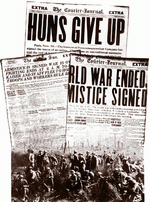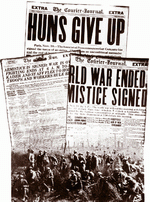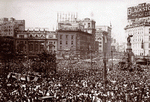Bob_cosgrove Member Username: Bob_cosgrove Post Number: 406 Registered: 03-2005 |
The following is from The Detroit News "Rear View Mirror" past feature. Bob Cosgrove ============================== ============= The first Armistice Day: When the doughboys came marching home By Patricia Zacharias / The Detroit News At 3 a.m. Detroit time on Nov. 11, 1918, the imperial German army radioed to the world that it had signed the Allied unconditional terms of surrender. The guns of the Great War, later known as World War I, became silent, replaced by outbursts of joy across the nation. It was over, over there. Within hours, the city of Detroit became a vast cheering throng. Whistles, sirens and church bells proclaimed the joyous word to the sleeping city. Acting Mayor Jacob Outhard quickly sent police patrols and fire trucks racing through the streets, sirens shrieking, carrying the good news. Before dawn, the streets filled with delirious people ringing bells, pounding on tin cans and washboards, blowing horns and whistles. Night workers in the munitions plants left their shops and joined the ever-increasing crowds. By common consent, everyone headed for the center of downtown. Everyone who owned a flag started a parade. The parades went anywhere, everywhere and nowhere. Every truck and vehicle headed downtown packed with celebrating Detroiters. By 6 a.m., 80 percent of the police force joined to help control the celebration. Conscientious workers on their way to their jobs changed their minds when they arrived downtown. They, too, joined the revelers. "Closed -- Too Happy to Work" read a sign in a Woodward jewelry store. Every store, every office, every factory closed. The celebration was a long time coming. The war, known at first as the European War, had started in 1914 involving Germany and England and its allies. After German submarines attacked American merchant ships, the United States joined the war. Michigan sent its sons to the Army, Navy and Marines Corps. -- 135,485 of them in all. Volunteers and draftees alike, they said their goodbyes at the train station in Detroit, leaving tearful mothers and sweethearts waving goodbye. Approximately 5,000 never came home. Noisemakers and flags were the most popular items of the day. So when word of the armistic came, the suffocating crowds downtown caused no complaints. Tons of confetti fell from the windows of office buildings. Line dancers wound through Cadillac Square singing "Funiculi, Funicula," a popular wartime tune. The sea of celebrators moved to City Hall, pounding on the doors for admittance. All day long, groups snake-danced wildly through the mayor's office. Mayor Outhard issued a holiday proclamation, however unnecessary it may have been. Hours before, everyone had unanimously ordained Nov. 11 a holiday. Automobiles roared throught the streets, dragging effigies of the Kaiser and the crown prince. Similiar effigies dangled from rooftops all over town. Airplanes hovered over the city, bringing the only tragedy. An airplane circling over the Fyfe Building struck a flagpole on top, then crashed through a house at Witherell and Montcalm. But fortunately, it missed the downtown crowds two blocks away. As night came, streets in various sections of the city closed for block parties. People danced in the ballrooms, the Graystone and the Vanity, and in the streets. Happy bonfires blazed everywhere. Crowds filled every inch of downtown Detroit as word spread of the armistice. A few days after the armistice celebration, more than 100,000 of Detroit's residents again gathered, this time for hours in the rain, along two miles of glistening city pavement, wanting to continue their rejoicing. Their prayers for the end of the carnage answered, they listened to a speech by the new Roman Catholic bishop, the Rt. Rev. Michael J. Gallagher. "America must not falter now in the fight to end the domain of human rights and human liberty," he declared. "We must not allow the aims with which we entered the struggle to fall short of fulfillment. Those aims were to extend to all the world the measure of freedom that we enjoy -- to give all peoples the right of self-determination in government; to allow no nation, however great, to enslave a race, however weak." The following year, in 1919, President Woodrow Wilson proclaimed Nov. 11 as Armistice Day to remind Americans of the tragedies of war. During the 1920s and '30s, thousands turned out annually to pay homage to the war dead. A 1938 law made the day a federal holiday. Every American town paraded, as did every town in Canada and England, where many knew it as Remembrance Day and a few called it Victory Day. There were orations, many of them quite heady: the belief still afloat that we had seen the last of war and that great dream made many a speaker eloquent. It was a real holiday, and to some a holy day. Revelers fashioned effigies of Kaiser Wilhelm. Detroit church bells and factory whistles chimed and rang at 11 a.m. every Nov. 11. There would be no school, but there would be church services and parades. People would decorate graves and lay wreaths at war monuments. In some towns, a bugler would blow taps at the main intersection at exactly 11 a.m. and all traffic and commerce would halt for two minutes to honor the war's dead. Newspapers would rerun the exploits of Sgt. Alvin York, the humble mountain boy trom Tennnessee who shot Germans as easily as he shot wild turkeys back home and who in one remarkable day in the Argonne Forest, captured 132 of the kaiser's men singlehandedly. The pictorial magazines reran their photos of the first flying aces, the daring men of the Lafayette Escadrille, who flew into the skies in paper-wrapped airplanes to battle the Red Baron. America was full of its own rightness and full of the belief that its doughboys had ended the war for all time. It would keep faith with those who were buried among the poppies, and it seemed that everyone who could rhyme wrote his own poem to say so. Every answering poem told the dead to sleep peacefully, for we would see that the guns stayed silent. But too soon the euphoria ended and another, bigger war engulfed the nation. Armistice Day remained a holiday. People still decorated the old graves, but the speeches came harder. All the stuff about no more wars faded into pointlessness by the headlines of World War II. Remembrances of the Armistice of 1918 became humbler and more silent, and some said, irrelevant. After World War II came Korea and Vietnam. Today there are many Americans who, if you mention Armistice Day, will say, "What's that?" In 1954, Congress changed the name to Veterans Day, still Nov. 11 but now honoring the dead of all wars. In 1971, it became one of our movable federal holidays, to give us another long weekend -- the new date the fourth Monday of October. Veterans groups argued the new date had no meaning. State after state moved the remembrance back to to Nov. 11 on their own. By 1978, Congress made it officially Nov. 11 again. Who will stop on November 11 with a moment of silence to thank those young soldiers who gave up their lives? Who will remember the graves of 400 Americans buried in Flanders Fields and at the tomb of the Unknown Soldier? A surprising number of Europeans will: Unlike Americans, many of them have known war in their own neighborhoods and they didn't forget the horrors. People climbed lightposts and waved from every window of the old Pontchartrain Hotel as the throng gathered outside on Nov. 11, 1918. In Flanders Fields In Flanders fields the poppies blow Between the cross, row on row, That mark our place: and in the sky The larks, still bravely singing fly Scare hear amid the guns below We are the Dead. Short days ago We lived, felt dawn, saw sunset glow, Loved and were loved, and now we lie In Flanders fields. Take up our quarrel with the foe: To you from failing hands we throw The torch; be yours to hold it high. If ye break faith with us who die We shall not sleep, though poppies grow In Flanders fields. -- John McCrae, 1872-1918 Michigan lost 5,000 men in the war, including those killed in action, those who died of wounds and those who died of disease. The number of Michigan wounded was about 15,000. | ||
Mikeg Member Username: Mikeg Post Number: 369 Registered: 12-2005 |
Thanks, Bob, for the reminder of how Veterans Day came to be and of Michigan's contribution to the Great War. Another Detroit News Rear View Mirror article titled Detroit's Polar Bears and Their Confusing War highlights the regiment known as "Detroit's Own" which continued fighting the Bolsheviks in North Russia for another six months after Nov. 11, 1918. | ||
Kathleen Member Username: Kathleen Post Number: 1687 Registered: 10-2003 |
I'll take this opportunity to repost a link to the J.F.D Carrico Diary website where, through the effort of Mr. Carrico's grandson, you can read a young man's personal account of November 11, 1918 in Detroit as well as a whole year of his life in the year 1918: http://www.carrico.net/jfc1918 .htm | ||
Bob_cosgrove Member Username: Bob_cosgrove Post Number: 408 Registered: 03-2005 |
Here are two of the photos that appeared with The Detroit News "Rear View Mirror" article posted above. Bob Cosgrove  \popgif \popgif {87102,Armistice Day crowd 11-11-1918 from Detroit News article } | ||
Bob_cosgrove Member Username: Bob_cosgrove Post Number: 409 Registered: 03-2005 |
  Here's a repost of the photos mentioned in my previous message, since they didn't come out properly. Bob Cosgrove | ||
Rustic Member Username: Rustic Post Number: 2938 Registered: 10-2003 |
mikeg, thanks for that link to the polar bears ... compelling not only in and of itself but also given that that sorta thing was repeated throughout the 20th century (and apparently into this century as well ...) |